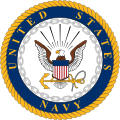List of United States Navy vice admirals since 2020
 From Wikipedia - Reading time: 20 min
From Wikipedia - Reading time: 20 min

vice admiral
The rank of vice admiral (or three-star admiral) is the second-highest rank normally achievable in the United States Navy, and the first to have a specified number of appointments set by statute. It ranks above rear admiral (two-star admiral) and below admiral (four-star admiral).
There have been 57 vice admirals in the U.S. Navy since 1 January 2020, four of whom were promoted to four-star admiral. All 57 achieved that rank while on active duty in the U.S. Navy. Admirals entered the Navy via several paths: 27 were commissioned via Naval Reserve Officers Training Corps (NROTC) at a civilian university, 21 via the U.S. Naval Academy (USNA), four via Aviation Officer Candidate School (AOCS), two via Officer Candidate School (OCS), one via direct commission (direct), and one via the California State University Maritime Academy (CSU Maritime).
List of admirals
[edit]Entries in the following list of vice admirals are indexed by the numerical order in which each officer was promoted to that rank while on active duty, or by an asterisk (*) if the officer did not serve in that rank while on active duty. Each entry lists the admiral's name, date of rank,[a] active-duty positions held while serving at three-star rank,[b] number of years of active-duty service at three-star rank (Yrs),[c] year commissioned and source of commission,[d] number of years in commission when promoted to three-star rank (YC),[e] and other biographical notes.[f]
| # | Name | Photo | Date of rank[a] | Position[b] | Yrs[c] | Commission[d] | YC[e] | Notes[f] |
|---|---|---|---|---|---|---|---|---|
| 1 | Randy B. Crites | 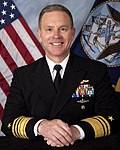
|
15 May 2020 |
|
3 | 1985 (OCS)[g] | 35 | (1962– ) |
| 2 | Yancy B. Lindsey | 
|
29 May 2020 |
|
3 | 1986 (AOCS) | 34 | (1962– ) |
| 3 | Eugene H. Black III | 
|
1 Jun 2020 |
|
4 | 1986 (USNA) | 34 | (1964– ) |
| 4 | Jeffrey E. Trussler | 
|
5 Jun 2020 |
|
3 | 1985 (NROTC) | 35 | (1963– ) |
| 5 | William J. Galinis | 
|
19 Jun 2020 |
|
3 | 1983 (USNA) | 37 | (1961– ) |
| 6 | Michelle C. Skubic | 
|
24 Jul 2020 |
|
4 | 1988 (NROTC) | 32 | (1966– ) Supply Corps. |
| 7 | Roy I. Kitchener | 
|
3 Aug 2020 |
|
3 | 1984 (NROTC) | 36 | (1962– ) |
| 8 | John B. Mustin | 
|
7 Aug 2020 |
|
4 | 1990 (USNA) | 30 | (1967– ) Son of Navy vice admiral Henry C. Mustin; grandson of Navy vice admiral Lloyd M. Mustin; step-great grandson of Navy four-star admiral George D. Murray. |
| * | Samuel J. Paparo Jr. | 
|
19 Aug 2020 |
|
1 | 1987 (NROTC) | 33 | (1964– )[h] Promoted to admiral, 5 May 2021. |
| 9 | Kenneth R. Whitesell | 
|
2 Oct 2020 |
|
3 | 1985 (AOCS) | 35 | (1961– ) |
| 10 | Jeffrey W. Hughes | 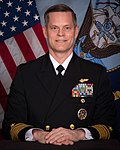
|
1 Feb 2021 |
|
4 | 1988 (NROTC) | 33 | (1966– ) |
| 11 | C. Bradford Cooper II | 
|
5 May 2021 |
|
4 | 1989 (USNA) | 32 | (1967– ) |
| 12 | Kelly A. Aeschbach | 
|
7 May 2021 |
|
3 | 1990 (NROTC) | 31 | (1968– ) |
| * | Stephen T. Koehler | 
|
3 Jun 2021 |
|
3 | 1986 (NROTC) | 35 | (1964– ) Promoted to admiral, 4 Apr 2024. |
| 13 | John V. Fuller | 
|
11 Jun 2021 |
|
4 | 1987 (USNA) | 34 | (1965– ) |
| 14 | Karl O. Thomas |  |
8 Jul 2021 |
|
3 | 1986 (NROTC) | 35 | (1963– ) |
| 15 | Frank D. Whitworth III | 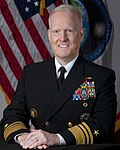 |
30 Jul 2021[1] |
|
4 | 1989 (NROTC) | 32 | (1967– ) Brother-in-law of Navy vice admiral Darse E. Crandall Jr. |
| 16 | Francis D. Morley |  |
4 Aug 2021 |
|
3 | 1988 (NROTC) | 33 | (1966– ) |
| 17 | Darse E. Crandall Jr. |  |
18 Aug 2021 |
|
3 | 1984 (NROTC) | 37 | (1962– ) Judge Advocate General's Corps. Brother-in-law of Navy vice admiral Frank D. Whitworth III. |
| 18 | Daniel W. Dwyer |  |
20 Aug 2021 |
|
4 | 1988 (CSU Maritime) | 33 | (1966– ) |
| 19 | Carl P. Chebi |  |
9 Sep 2021 |
|
4 | 1987 (NROTC) | 34 | (1965– ) |
| * | William J. Houston | 
|
10 Sep 2021 |
|
2 | 1990 (NROTC) | 31 | (1968– )[i] Promoted to admiral, 10 Jan 2024. |
| 20 | Collin P. Green | 
|
16 Dec 2021 |
|
3 | 1986 (USNA) | 35 | (1962– ) Navy SEAL. |
| 21 | Sara A. Joyner | 
|
3 Jun 2022 |
|
3 | 1989 (USNA) | 33 | (1967– ) |
| 22 | Richard J. Cheeseman Jr. | 
|
3 Jun 2022 |
|
3 | 1989 (NROTC) | 33 | (1966– )[j] |
| 23 | Michael E. Boyle | 
|
16 Jun 2022 |
|
3 | 1987 (NROTC) | 35 | (1965– ) |
| 24 | Craig A. Clapperton | 
|
4 Aug 2022 |
|
3 | 1989 (NROTC) | 33 | (1967– ) |
| 25 | Frank M. Bradley | 
|
10 Aug 2022 |
|
3 | 1991 (USNA) | 31 | (c. 1970– ) Navy SEAL. |
| 26 | Thomas E. Ishee | 
|
15 Sep 2022 |
|
2 | 1988 (OCS) | 34 | (1965– ) |
| 27 | Richard A. Correll | 
|
1 Dec 2022 |
|
3 | 1986 (NROTC) | 36 | (1964– ) |
| 28 | John F.G. Wade | 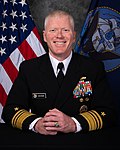
|
1 Dec 2022 |
|
3 | 1990 (USNA) | 32 | (1968– ) |
| * | Alvin Holsey | 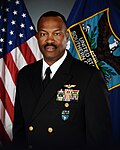
|
1 Feb 2023 |
|
1 | 1988 (NROTC) | 35 | (1965– )[h] Promoted to admiral, 7 Nov 2024. |
| 29 | James E. Pitts | 
|
5 Dec 2023 |
|
2 | 1986 (USNA) | 37 | (1964– ) |
| 30 | Jeffrey T. Jablon | 
|
5 Dec 2023 |
|
2 | 1987 (NROTC) | 36 | (1964– ) |
| 31 | Blake L. Converse | 
|
5 Dec 2023 |
|
2 | 1987 (NROTC) | 36 | (1965– ) |
| 32 | Shoshana S. Chatfield | 
|
13 Dec 2023 |
|
2 | 1987 (NROTC) | 36 | (1965– ) Relieved, 2025.[3] President, Naval War College, 2019–2023. |
| 33 | C. Scott Gray | 
|
18 Dec 2023 |
|
2 | 1989 (AOCS) | 34 | (1964– ) |
| 34 | Brendan R. McLane | 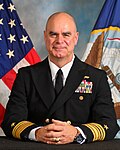
|
21 Dec 2023 |
|
2 | 1990 (USNA) | 33 | (1968– ) |
| 35 | John B. Skillman | 
|
22 Dec 2023 |
|
2 | 1986 (USNA) | 37 | (1964– ) |
| 36 | Robert M. Gaucher | 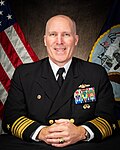
|
28 Dec 2023 |
|
2 | 1991 (USNA) | 32 | (c. 1966– ) |
| 37 | James P. Downey | 
|
3 Jan 2024 |
|
1 | 1987 (NROTC) | 37 | (1964– ) |
| 38 | Yvette M. Davids | 
|
11 Jan 2024 |
|
1 | 1989 (USNA) | 35 | (1967– ) Wife of Navy rear admiral Keith B. Davids. |
| 39 | John E. Gumbleton | 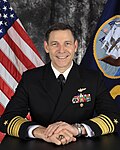
|
12 Jan 2024 |
|
1 | 1989 (NROTC) | 35 | (1967– ) |
| 40 | Douglas G. Perry |  |
12 Jan 2024 |
|
1 | 1989 (USNA) | 35 | (1967– ) |
| 41 | Daniel L. Cheever | 
|
31 Jan 2024 |
|
1 | 1988 (AOCS) | 36 | (1963– ) |
| 42 | George M. Wikoff | 
|
1 Feb 2024 |
|
1 | 1990 (NROTC) | 34 | (1968– ) |
| 43 | Frederick W. Kacher |  |
15 Feb 2024 |
|
1 | 1990 (USNA) | 34 | (1968– ) |
| 44 | Scott W. Pappano |  |
3 Jul 2024 |
|
1 | 1989 (USNA) | 35 | (c. 1967– ) |
| 45 | Michael J. Vernazza | 
|
26 Jul 2024 |
|
1 | 1990 (USNA) | 34 | (c. 1968– ) |
| 46 | Dion D. English | 
|
2 Aug 2024 |
|
1 | 1993 (NROTC) | 31 | (c. 1971– ) |
| 47 | Nancy S. Lacore | 
|
23 Aug 2024 |
|
1 | 1990 (NROTC) | 34 | |
| 48 | Christopher C. French |  |
5 Sep 2024 |
|
1 | 1992 (direct)[k] | 32 | Judge Advocate General's Corps. |
| 49 | Jeffrey T. Anderson | 
|
20 Sep 2024 |
|
1 | 1991 (USNA) | 33 | (c. 1969– ) |
| 50 | Peter A. Garvin | 
|
11 Oct 2024 |
|
1 | 1989 (USNA) | 35 | (c. 1967– ) President, Naval War College, 2023–2024. |
| 51 | Thomas M. Henderschedt |  |
30 Jun 2025 |
|
0 | 1992 (NROTC) | 33 | |
| 52 | Jeffrey J. Czerewko | 
|
1 Aug 2025 |
|
0 | 1990 (USNA) | 35 | |
| 53 | John E. Dougherty IV |  |
1 Aug 2025 |
|
0 | 1995 (USNA) | 30 |
Timeline
[edit]2020–present
[edit]
Background
[edit]Modern use of the rank
[edit]
Vice admirals in the United States Navy include commanders of numbered fleets[l] as well as high-level type commands and geographic commands, including the commanders of the naval submarine forces, naval surface forces, naval information forces and the chief of navy reserve. The superintendent of the United States Naval Academy has been a three-star vice admiral without interruption since John R. Ryan's tenure began in 1998.
As with any other service branch, vice admirals can hold joint assignments, of which there are 30 to 50 at any given time. Among the most prestigious of them is the director of the Joint Staff (DJS), principal staff advisor to the chairman of the Joint Chiefs of Staff and historically considered a stepping stone to four-star rank.[5] All deputy commanders of the unified combatant commands are of three-star rank,[m] as are directors of Defense Agencies not headed by a civilian such as the director of the Defense Intelligence Agency (DIRDIA).[6] Internationally-based three-star positions include the United States military representative to the NATO Military Committee (USMILREP), the commander of Allied Joint Force Command – Norfolk (JFC-NF), and the security coordinator for Israel and the Palestinian National Authority. All nominees for three-star rank must be confirmed via majority by the Senate before the appointee can take office and thus assume the rank.[7]
Statutory limits, elevations and reductions
[edit]

The U.S. Code states that no more than 34 officers in the U.S. Navy may hold the rank of vice admiral on the active duty list, aside from those on joint duty assignments.[8] Three-star positions can be elevated to four-star grade or reduced to two-star grade where deemed necessary, either to highlight their increasing importance[n] to the defense apparatus (or lack thereof) or to achieve parity with equivalent commands in other services or regions. Few three-star positions are set by statute, leading to their increased volatility as they do not require congressional approval to be downgraded.
- Rear Admiral Frank D. Whitworth II was promoted to vice admiral on 30 July 2021, making him the first director of intelligence of the Joint Staff to hold three-star rank.[1] The elevation would remain in place after Whitworth's assignment as director of the National Geospatial-Intelligence Agency, with the role being taken over by Lieutenant General Dimitri Henry.[9][10]
- Rear Admiral John F.G. Wade, commander of Joint Task Force Red Hill, was promoted to vice admiral on 1 December 2022.[11][12] Under the commander of USINDOPACOM, Wade was charged with overseeing the defueling of the closing Red Hill Underground Fuel Storage Facility from 2022 to 2024.[13][14]
- Lieutenant General Jeffrey A. Kruse was appointed the first advisor for military to the director of national intelligence in August 2021 as part of organizational changes to the ODNI. The role was created to serve as a "focal point" for the ODNI to communicate with the Department of Defense, including the under secretary of defense for intelligence and security, combat support agency directors and the combatant commands.[15]
Senate confirmations
[edit]Military nominations are considered by the Senate Armed Services Committee. While it is rare for three-star or four-star nominations to face even token opposition in the Senate, nominations that do face opposition due to controversy surrounding the nominee in question are typically withdrawn. Nominations that are not withdrawn are allowed to expire without action at the end of the legislative session.
- For example, the nomination of Major General Ryan F. Gonsalves for promotion to lieutenant general and assignment as commanding general of U.S. Army Europe was withdrawn in November 2017[16] after an investigation was launched into the general's inappropriate comment to a female Congressional staffer.[17] As a result, Gonsalves was administratively reprimanded and retired in May 2018.[17][18][19]
Additionally, events that take place after Senate confirmation may still delay or even prevent the nominee from assuming office.
- For example, Major General John G. Rossi, who had been confirmed for promotion to lieutenant general[20] and assignment as the commanding general of the U.S. Army Space and Missile Defense Command in April 2016[21] committed suicide two days before his scheduled promotion and assumption of command.[22] As a result, the then incumbent commander of USASMDC, Lieutenant General David L. Mann, remained in command beyond customary term limits until another nominee, Major General James H. Dickinson was confirmed by the Senate.[23]
See also
[edit]- List of active duty United States four-star officers
- List of active duty United States three-star officers
- List of United States Navy vice admirals on active duty before 1960
- List of United States Navy vice admirals from 2000 to 2009
- List of United States Navy vice admirals from 2010 to 2019
- List of United States Coast Guard vice admirals
- List of United States Public Health Service Commissioned Corps vice admirals
- List of United States military leaders by rank
- List of United States Navy four-star admirals
- Vice admiral (United States)
References
[edit]- ^ a b "United States Navy Flag Officers (Public), November 2021" (PDF). MyNavyHR. Archived from the original (PDF) on 2 November 2021. Retrieved 1 November 2021.
- ^ "Navy Assumes Responsibility of Red Hill Facility". DVIDS. Joint Base Pearl Harbor-Hickam, Hawaii: Navy Closure Task Force - Red Hill. 28 March 2024. Retrieved 29 March 2024.
- ^ White, Matt (7 April 2025). "Navy admiral fired from position as senior NATO planner". Task & Purpose. Retrieved 5 June 2025.
- ^ "Adm. Caudle Relinquishes Command of U.S. Fleet Forces Command". U.S. Navy. Norfolk, Virginia. 6 August 2025. Retrieved 8 August 2025.
- ^ Woodward, Bob (2006). State of Denial: Bush at War, Part III. Simon and Schuster. pp. 22, 40. ISBN 978-0-7432-7223-0.
scott fry joint staff.
- ^ "On Raising the Rank of the Chief of the National Guard Bureau" (PDF). Library of Congress. Library of Congress. February 2007. Archived from the original (PDF) on 24 July 2021. Retrieved 24 July 2021.
- ^ 10 U.S.C. § 601 – Positions of importance and responsibility: generals and lieutenant generals; admirals and vice admirals.
- ^ "10 U.S.C. § 525 – Distribution of commissioned officers on active duty in general officer and flag officer grades". United States Code. Retrieved 27 September 2024.
- ^ "PN1914 — Maj. Gen. Dimitri Henry — Marine Corps, 117th Congress (2021-2022)". U.S. Congress. 4 April 2022. Archived from the original on 4 July 2022. Retrieved 4 July 2022.
- ^ "General Officer Announcements". U.S. Department of Defense. 6 April 2022. Archived from the original on 4 July 2022. Retrieved 4 July 2022.
- ^ "United States Navy Flag Officers (Public), December 2022" (PDF). MyNavyHR. Archived from the original (PDF) on 2 December 2022. Retrieved 2 December 2022.
- ^ "Statement by Secretary of Defense Lloyd J. Austin III on the Appointment of Rear Adm. John Wade as the Commander of the Joint Task Force of the Red Hill Bulk Fuel Storage Facility". U.S. Department of Defense. 19 September 2022. Retrieved 25 September 2022.
- ^ Mongilio, Heather (24 October 2022). "Red Hill Fuel to Stay at Joint Base Pearl Harbor-Hickham, Says Task Force". USNI News. Archived from the original on 4 November 2022. Retrieved 2 December 2022.
- ^ "Red Hill Bulk Fuel Storage Facility, Oahu, Hawaii Defueling Plan" (PDF). Hawaii State Department of Health. U.S. Department of Defense. 30 June 2022. Archived from the original (PDF) on 11 July 2022. Retrieved 2 December 2022.
- ^ "DNI Welcomes New Senior Military Adviser". Office of the Director of National Intelligence. 17 August 2020. Archived from the original on 19 March 2021. Retrieved 4 July 2022.
- ^ "PN762 — Maj. Gen. Ryan F. Gonsalves — Army, 115th Congress (2017-2018)". U.S. Congress. 13 July 2017. Archived from the original on 16 March 2022. Retrieved 11 August 2021.
- ^ a b Myers, Meghann (6 January 2018). "Army 2-star loses promotion after calling congressional staffer 'sweetheart'". Army Times. Retrieved 20 May 2022.
- ^ Bryant, Kevin (10 January 2018). "Army general now 'special assistant' after 'sweetheart' comment to female staffer". KDH News. Archived from the original on 23 May 2022. Retrieved 23 May 2022.
- ^ Vandiver, John (3 May 2018). "General retires 6 months after IG chastised his behavior toward congressional staffer". Stars and Stripes. Archived from the original on 11 January 2021. Retrieved 20 May 2022.
- ^ "PN1329 — Maj. Gen. John G. Rossi — Army, 114th Congress (2015-2016)". U.S. Congress. 14 April 2016. Archived from the original on 16 March 2022. Retrieved 10 August 2021.
- ^ "Rossi confirmed for appointment to SMDC". U.S. Army. Redstone Arsenal, Alabama: USASMDC/ARSTRAT Public Affairs. 3 May 2016. Archived from the original on 17 April 2022. Retrieved 23 May 2022.
- ^ "Army: Two-star general committed suicide on Alabama military base". CBS News. Washington, D. C.: Associated Press. 28 October 2016. Archived from the original on 16 March 2022. Retrieved 20 May 2022.
- ^ "PN1823 — Maj. Gen. James H. Dickinson — Army, 114th Congress (2015-2016)". U.S. Congress. 15 November 2016. Archived from the original on 21 March 2022. Retrieved 10 August 2021.
Notes
[edit]- ^ a b Dates of rank are taken, where available, from the U.S. Navy register of active and retired commissioned officers, or from the monthly U.S. Navy flag officer roster. The date listed is that of the officer's first promotion to vice admiral. If such a date that qualifies for the above cannot be found, the next date substituted should be that of the officer's assumption of his/her first three-star appointment. Failing which, the officer's first Senate confirmation date to vice admiral should be substituted. For officers promoted to vice admiral on the same date, they should be organized first by officers promoted to four-star rank, number of years spent as a vice admiral, then by the tier of their first listed assignment upon promotion to vice admiral (joint assignments followed by service assignments).
- ^ a b Positions listed are those held by the officer when promoted to vice admiral. Dates listed are for the officer's full tenure, which may predate promotion to three-star rank or postdate retirement from active duty. Positions held in an acting capacity are italicized.
- ^ a b The number of years of active-duty service at three-star rank is approximated by subtracting the year in the "Date of rank" column from the last year in the "Position" column. Time spent between active-duty three-star assignments is not counted.
- ^ a b The year commissioned is taken to be the year the officer graduated from the U.S. Naval Academy, or equivalent. Sources of commission are listed in parentheses after the year of commission and include: the United States Naval Academy (USNA); Naval Reserve Officers Training Corps (NROTC) at a civilian university; NROTC at a senior military college such as the Virginia Military Institute (VMI), Norwich University (Norwich), Pennsylvania Military College (PMC), or Widener University (Widener); Officer Candidate School (OCS); Aviation Officer Candidate School (AOCS); warrant; the Massachusetts Maritime Academy (MMA); United States Military Academy (USMA); and the United States Air Force Academy (USAFA).
- ^ a b The number of years in commission before being promoted to three-star rank is approximated by subtracting the year in the "Commission" column from the year in the "Date of rank" column.
- ^ a b Notes include years of birth and death; awards of the Medal of Honor, Congressional Gold Medal, Presidential Medal of Freedom, or honors of similar significance; major government appointments; university presidencies or equivalents; familial relationships with significant military officers or significant government officials such as U.S. Presidents, cabinet secretaries, U.S. Senators, or state governors; and unusual career events such as premature relief or death in office.
- ^ Commissioned via the Navy Nuclear Propulsion Officer Candidate (NUPOC) Program.
- ^ a b Served as a combatant commander (CCDR).
- ^ Promoted directly from rank of rear admiral (lower half).
- ^ Directly commissioned via the JAG Corps Student Program.
- ^ only fleets subordinated to U.S. Fleet Forces Command, U.S. Naval Forces Central Command and the U.S. Pacific Fleet.
- ^ The deputy commander of U.S. European Command was a four-star position until 2007, when it was reduced in rank to make way for the establishment of U.S. Africa Command, commanded by a four-star officer. The last four-star deputy commander of USEUCOM, General William E. Ward, also became the first commander of USAFRICOM.
- ^ 10 U.S.C. § 601 refers to positions held by four-star and three-star officers as "positions of importance and responsibility".
Bibliography
[edit]- United States Navy Flag Officers (Public), January 2021 (PDF), Washington, D.C.: MyNavyHR, January 2021, archived from the original (PDF) on 17 April 2021, retrieved 4 July 2022
- United States Navy Flag Officers (Public), March 2021 (PDF), Washington, D.C.: MyNavyHR, March 2021, archived from the original (PDF) on 18 May 2021, retrieved 4 July 2022
- United States Navy Flag Officers (Public), April 2021 (PDF), Washington, D.C.: MyNavyHR, April 2021, archived from the original (PDF) on 17 April 2021, retrieved 4 July 2022
- United States Navy Flag Officers (Public), May 2021 (PDF), Washington, D.C.: MyNavyHR, May 2021, archived from the original (PDF) on 18 May 2021, retrieved 4 July 2022
- United States Navy Flag Officers (Public), June 2021 (PDF), Washington, D.C.: MyNavyHR, June 2021, archived from the original (PDF) on 3 June 2021, retrieved 4 July 2022
- United States Navy Flag Officers (Public), July 2021 (PDF), Washington, D.C.: MyNavyHR, July 2021, archived from the original (PDF) on 9 July 2021, retrieved 4 July 2022
- United States Navy Flag Officers (Public), August 2021 (PDF), Washington, D.C.: MyNavyHR, August 2021, archived from the original (PDF) on 6 August 2021, retrieved 4 July 2022
- United States Navy Flag Officers (Public), September 2021 (PDF), Washington, D.C.: MyNavyHR, September 2021, archived from the original (PDF) on 1 September 2021, retrieved 4 July 2022
- United States Navy Flag Officers (Public), October 2021 (PDF), Washington, D.C.: MyNavyHR, October 2021, archived from the original (PDF) on 1 October 2021, retrieved 4 July 2022
- United States Navy Flag Officers (Public), November 2021 (PDF), Washington, D.C.: MyNavyHR, November 2021, archived from the original (PDF) on 2 November 2021, retrieved 4 July 2022
- United States Navy Flag Officers (Public), January 2022 (PDF), Washington, D.C.: MyNavyHR, January 2022, archived from the original (PDF) on 4 July 2022, retrieved 4 July 2022
- United States Navy Flag Officers (Public), February 2022 (PDF), Washington, D.C.: MyNavyHR, February 2022, archived from the original (PDF) on 4 February 2022, retrieved 4 July 2022
- United States Navy Flag Officers (Public), March 2022 (PDF), Washington, D.C.: MyNavyHR, March 2022, archived from the original (PDF) on 2 March 2022, retrieved 4 July 2022
- United States Navy Flag Officers (Public), April 2022 (PDF), Washington, D.C.: MyNavyHR, April 2022, archived from the original (PDF) on 2 April 2022, retrieved 4 July 2022
- United States Navy Flag Officers (Public), May 2022 (PDF), Washington, D.C.: MyNavyHR, May 2022, archived from the original (PDF) on 30 April 2022, retrieved 4 July 2022
- United States Navy Flag Officers (Public), June 2022 (PDF), Washington, D.C.: MyNavyHR, June 2022, archived from the original (PDF) on 1 June 2022, retrieved 4 July 2022
- United States Navy Flag Officers (Public), July 2022 (PDF), Washington, D.C.: MyNavyHR, July 2022, archived from the original (PDF) on 5 July 2022, retrieved 6 July 2022
- United States Navy Flag Officers (Public), August 2022 (PDF), Washington, D.C.: MyNavyHR, August 2022, archived from the original (PDF) on 2 August 2022, retrieved 2 August 2022
- United States Navy Flag Officers (Public), September 2022 (PDF), Washington, D.C.: MyNavyHR, September 2022, archived from the original (PDF) on 2 September 2022, retrieved 2 September 2022
- United States Navy Flag Officers (Public), October 2022 (PDF), Washington, D.C.: MyNavyHR, October 2022, archived from the original (PDF) on 27 October 2022, retrieved 2 October 2022
- United States Navy Flag Officers (Public), November 2022 (PDF), Washington, D.C.: MyNavyHR, November 2022, archived from the original (PDF) on 2 November 2022, retrieved 2 November 2022
- United States Navy Flag Officers (Public), December 2022 (PDF), Washington, D.C.: MyNavyHR, December 2022, archived from the original (PDF) on 2 December 2022, retrieved 2 December 2022
- United States Navy Flag Officers (Public), January 2023 (PDF), Washington, D.C.: MyNavyHR, January 2023, archived from the original (PDF) on 5 January 2023, retrieved 22 March 2023
- United States Navy Flag Officers (Public), February 2023 (PDF), Washington, D.C.: MyNavyHR, February 2023, archived from the original (PDF) on 2 February 2023, retrieved 22 March 2023
- United States Navy Flag Officers (Public), March 2023 (PDF), Washington, D.C.: MyNavyHR, March 2023, archived from the original (PDF) on 2 March 2023, retrieved 22 March 2023
- United States Navy Flag Officers (Public), April 2023 (PDF), Washington, D.C.: MyNavyHR, April 2023, archived from the original (PDF) on 6 April 2023, retrieved 9 April 2023
- United States Navy Flag Officers (Public), May 2023 (PDF), Washington, D.C.: MyNavyHR, May 2023, archived from the original (PDF) on 2 May 2023, retrieved 2 May 2023
- United States Navy Flag Officers (Public), January 2024 (PDF), Washington, D.C.: MyNavyHR, January 2024, archived from the original (PDF) on 9 January 2024, retrieved 9 January 2024
- United States Navy Flag Officers (Public), February 2024 (PDF), Washington, D.C.: MyNavyHR, February 2024, archived from the original (PDF) on 6 February 2024, retrieved 6 February 2024
- United States Navy Flag Officers (Public), March 2024 (PDF), Washington, D.C.: MyNavyHR, March 2024, archived from the original (PDF) on 2 March 2024, retrieved 2 March 2024
- United States Navy Flag Officers (Public), July 2024 (PDF), Washington, D.C.: MyNavyHR, July 2024, archived from the original (PDF) on 5 July 2024, retrieved 5 July 2024
- United States Navy Flag Officers (Public), August 2024 (PDF), Washington, D.C.: MyNavyHR, August 2024, archived from the original (PDF) on 2 August 2024, retrieved 2 August 2024
- United States Navy Flag Officers (Public), September 2024 (PDF), Washington, D.C.: MyNavyHR, September 2024, archived from the original (PDF) on 5 September 2024, retrieved 5 September 2024
- United States Navy Flag Officers (Public), October 2024 (PDF), Washington, D.C.: MyNavyHR, October 2024, archived from the original (PDF) on 2 October 2024, retrieved 2 October 2024
- United States Navy Flag Officers (Public), July 2025 (PDF), Washington, D.C.: MyNavyHR, July 2025, archived from the original (PDF) on 2 July 2025, retrieved 3 July 2025
 KSF
KSF